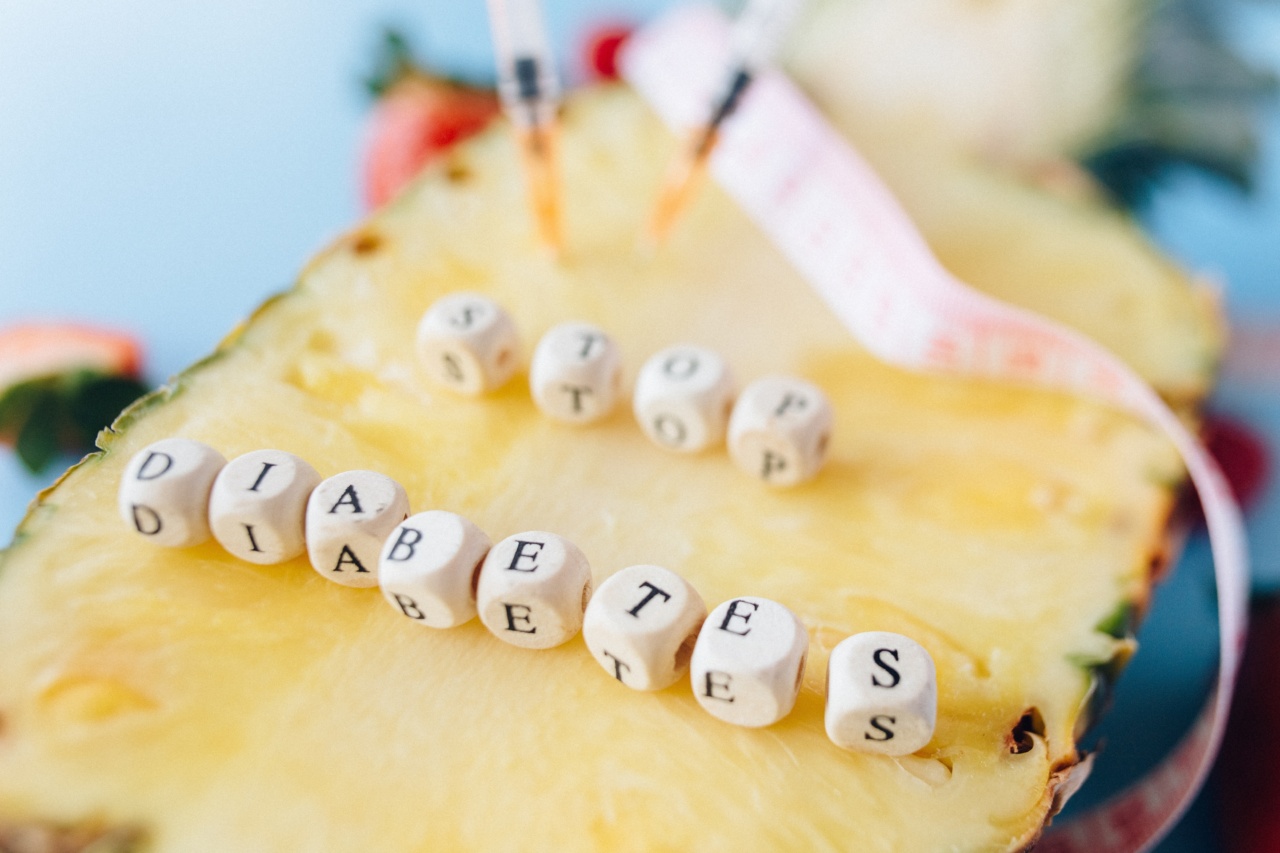Diet plays a crucial role in managing diabetes. It can help regulate blood sugar levels, control weight, and reduce the risk of complications associated with diabetes.
By making healthy food choices and adopting a balanced eating plan, individuals with diabetes can improve their overall health and achieve better control over their condition. This article explores the link between diet and diabetes control, providing valuable insights and tips for maintaining optimal blood sugar levels.
Understanding Diabetes
Diabetes is a chronic condition characterized by the body’s inability to properly regulate blood sugar levels. There are two main types of diabetes: type 1 and type 2.
While type 1 diabetes is usually diagnosed in childhood and occurs when the body fails to produce insulin, type 2 diabetes is more prevalent and typically develops in adulthood due to a combination of genetic and lifestyle factors. Both types of diabetes can be managed through dietary interventions.
Importance of a Balanced Diet
A balanced diet is essential for individuals with diabetes to maintain stable blood sugar levels and prevent spikes or drops in glucose. It involves consuming a variety of nutrient-rich foods in appropriate portions.
A balanced meal should consist of carbohydrates, proteins, and fats, with an emphasis on whole grains, lean proteins, and healthy fats.
Controlling Carbohydrate Intake
Carbohydrates significantly impact blood sugar levels, making it crucial to monitor and control their intake in a diabetic diet.
Individuals with diabetes should focus on consuming complex carbohydrates, such as whole grains, legumes, and fruits, which are digested more slowly and have a gentler effect on blood glucose levels. Simple carbohydrates, such as refined sugars and processed foods, should be avoided or limited to prevent sudden spikes in blood sugar.
The Role of Fiber
Fiber is beneficial for individuals with diabetes as it promotes better blood sugar control, helps maintain a healthy weight, and reduces the risk of heart disease.
It slows down the digestion and absorption of carbohydrates, preventing rapid spikes in blood glucose levels. Including high-fiber foods like vegetables, fruits, whole grains, and legumes in the diet can be highly advantageous for diabetes management.
The Power of Protein
Protein is an essential nutrient that aids in blood sugar control and promotes satiety, making it an excellent choice for individuals with diabetes. It has a minimal impact on blood glucose levels and can help regulate hunger and prevent overeating.
Lean protein sources, such as fish, poultry, tofu, and legumes, should be incorporated into meals to support balanced blood sugar levels.
Glycemic Index and Glycemic Load
The glycemic index (GI) and glycemic load (GL) are important measures when considering the impact of specific foods on blood sugar levels. The glycemic index ranks carbohydrates based on how quickly they raise blood glucose levels.
High GI foods, such as white bread and sugary snacks, cause rapid spikes in blood sugar and should be consumed in moderation. On the other hand, low GI foods, like whole grains and non-starchy vegetables, are digested more slowly, resulting in a gradual rise in blood glucose.
The glycemic load takes into account both the quantity and quality of carbohydrates in a food, providing a more accurate measure of its impact on blood sugar.
Healthy Fats for Diabetes
While it’s essential to limit saturated and trans fats, incorporating healthy fats into a diabetic diet promotes heart health and helps control blood sugar.
Monounsaturated fats and polyunsaturated fats, found in foods such as avocados, nuts, seeds, and fatty fish, have been shown to improve insulin sensitivity and reduce inflammation.
Sweeteners and Artificial Sugars
Individuals with diabetes often look for sugar alternatives to satisfy their sweet cravings without affecting blood sugar levels.
Artificial sweeteners, such as aspartame and sucralose, can be used in moderation, but it’s important to be cautious as some people may experience side effects. Natural sweeteners like stevia and monk fruit extract can also be used as sugar substitutes, providing sweetness without the added calories or carbohydrates.
Portion Control and Meal Planning
Portion control is vital for managing diabetes, as consuming large quantities of food at once can lead to elevated blood sugar levels. Monitoring portion sizes and spacing meals throughout the day can help maintain more stable glucose levels.
Additionally, meal planning and preparation in advance can support healthier food choices, prevent impulsive eating, and ensure a well-balanced diet.
Physical Activity and Diabetes Management
Along with a healthy diet, regular physical activity is crucial for diabetes management. Exercise helps lower blood sugar levels, increase insulin sensitivity, and improve overall well-being.
Engaging in a combination of aerobic exercises, such as brisk walking or swimming, and strength training activities can further enhance diabetes control.
Consulting a Registered Dietitian
When it comes to diabetes management, it’s essential to consult a registered dietitian who specializes in diabetic nutrition.
A dietitian can provide personalized guidance, meal plans, and support to help individuals make appropriate dietary choices and achieve optimal diabetes control.
Conclusion
Diet plays a fundamental role in diabetes control.
By adopting a balanced eating plan, monitoring carbohydrate intake, incorporating fiber-rich foods, and including adequate proteins and healthy fats, individuals with diabetes can improve their blood sugar control and overall health. Additionally, being mindful of portion sizes, considering glycemic index/load, and engaging in regular physical activity can further support diabetes management.
Consulting with a registered dietitian is crucial for personalized guidance and achieving the best results in diabetes control and overall well-being.































